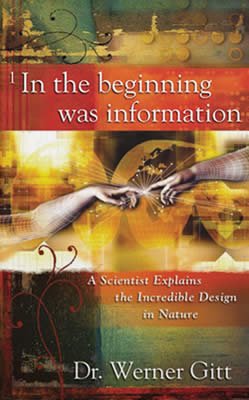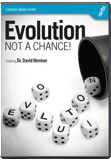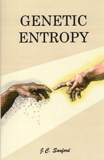
Chapter 16
A Biblical Analogy of the Four Fundamental Entities
Mass, Energy, Information, and Will
The question about the origin of matter and the energies we observe in action is already answered in the first verse of the Bible.
The four basic quantities in creation: These four entities, namely mass (or matter), energy, information, and volition, were discussed in paragraph 3.3. The latter two were described as being non-material. Both material quantities, mass and energy, are subject to conservation laws, being linked by the equivalence formula E = m x c2. This means that they cannot be created by any natural process, neither can they be destroyed. Does this now mean that mass and energy are by nature eternal? No, it should be noted that none of the natural laws has existed forever, neither will any of them always be valid in the future. They were created together with everything else (see Theorem N10b in paragraph 2.3) and perform their wisely allocated functions only since creation week. “By the seventh day God had finished the work he had been doing” (Genesis 2:2).
The question about the origin of matter and the energies we observe in action is already answered in the first verse of the Bible: God created them! Everything came into being through His inconceivable power (Jeremiah 10:12 and Romans 1:20). The active person at creation was Jesus, “through whom he made the universe” (Hebrews 1:2). Jesus is also the sustainer of the entire creation, “sustaining all things by his powerful word” (Hebrews 1:3). His creative and His sustaining acts are not restricted to matter and energy, but also hold for the information contained in biological systems. We can now conclude (John 1:1–3; Colossians 1:16; Hebrews 1:2):
—Jesus is the source of all energy,
—Jesus is the source of all matter, and
—Jesus is the source of all biological information.
The totality of the information present in living organisms, designated I, represents a value characterized by high quality as well as a large volume. In the beginning, information was established through volition. The Bible tells us about the link between will and wisdom:
—“You created all things, and by your will they were created and have their being” (Revelation 4:11).
—“How many are your works, O LORD! In wisdom you made them all; the earth is full of your creatures” (Psalm 104:24).
—“Christ, in whom are hidden all the treasures of wisdom and knowledge” (Colossians 2:2–3).
In the light of Colossians 1:17 and Hebrews 1:3, we can say that Jesus sustains all energy, all matter, and all biological information (i.e., He sustains all life). Everything that exists does so through Christ; He is the First Cause of all things. However, supporters of the doctrine of evolution deny each and every purposeful cause for this world and deny any possibility of a personal sustaining will. They thus mislead themselves and are forced to regard information as a material quantity which originated in matter. We have scientifically shown that this view is erroneous.
According to His will, God gave us many creative gifts. For example: Our free will enables us to act creatively. The gift of language is the instrument through which we can produce new information (creative information!). There are two things which we cannot do: we cannot create mass (or energy), neither can we destroy it.
The spiritual meaning of the four basic entities: It should be noted that the above-mentioned four fundamental quantities have a spiritual dimension in the Bible where man is concerned. For example, in 1 Corinthians 2:14–15 a distinction is made between the natural man and the spiritual man. The former is exclusively concerned with this world, and is not bothered with the message of the Bible. His philosophy ignores God, and he thus does not consider Jesus Christ, neither is he concerned about God’s purpose, salvation. He will be eternally lost without the Savior of sinners. Paul describes this situation in the following words: “For the message of the cross is foolishness to those who are perishing, but to us who are being saved it is the power of God” (1 Corinthians 1:18).
On the other hand, a spiritual person lives in close communion with God (Ephesians 5:18–20). The phrase “in Christ” occurs 196 times in the New Testament (e.g., John 15:4; Romans 6:1; 1 Corinthians 1:30; Galatians 3:28), referring to somebody who has tied his life to Jesus and who is sure of his eternal life (1 John 5:13). Such a person eagerly hears and reads God’s Word (Rev. 1:3) and has access to the spiritual dimension of the Bible.

Figure 30: Basic units in the life of a spiritual person. The four fundamental entities—mass, energy, information, and will—as depicted in Figure 8, have been created by God. In the case of believers, we find a spiritual analogy for these entities, described by the Bible as divine in essence.
The four basic entities—mass, energy, information, and will—are illustrated in Figure 30, each time with the appellation “spiritual” in analogy to the biblical description of a spiritual person. It is now clear that these four created entities originated from God, the Creator. When a natural man is changed into a spiritual person, it is also a creative act of God, working through Jesus: “Therefore, if anyone is in Christ, he is a new creation; the old has gone, the new has come!” (2 Corinthians 5:17). This creative transformation from old to new, from the natural to the spiritual, and from lost to saved, is called both repentance in the Bible (Luke 22:32; Acts 3:19) and being born again (John 3:3 and 1 Peter 1:23). This act can only be accomplished through our own will (e.g., Matthew 23:37; Luke 19:14). Our willingness or our rejection is decisive for life and death, comprising the choice between heaven and hell. The four spiritual foundations take a central place for a born-again, a believing, or a spiritual person:
1. Spiritual information: In the Old Testament, God said parabolically that He has a fixed purpose when sending His Word to a recipient: “As the rain and the snow come down from heaven, and do not return to it without watering the earth and making it bud and flourish, so that it yields seed for the sower and bread for the eater, so is my word that goes out from my mouth: It will not return to me empty, but will accomplish what I desire and achieve the purpose for which I sent it” (Isaiah 55:10–11). This clearly illustrates the purpose-achieving and the human-assisting way of divine information.
By means of several technological and biological examples we will illustrate (see appendix A3) that in such systems, in each case:
—energy is saved,
—waste of energy is prevented,
—energy is utilized, and
—the consumption of energy is optimized.
The divine (or spiritual) information affects us in a similar way, because it
—saves us from being led astray,
—prevents us from wasting our lives,
—uses our gifts in life (natural talents, time, and money),
—optimizes our life situations (marriage, occupation, and pastimes), and
—saves our life from perdition, giving us eternal life.
2. Spiritual will: There is a saying which goes like this: “Whoever does what he desires, often does what he should not do.” Martin Luther stated, “Whenever our free will does what is inherent, then we commit a deadly sin.” Even the Apostle sent to many nations, Paul, confessed, “I know that nothing good lives in me, that is, in my sinful nature. For I have the desire to do what is good, but I cannot carry it out. For what I do is not the good I want to do; no, the evil I do not want to do—this I keep on doing” (Romans 7:18–19). Our best ethical intentions for doing good will not be successful if we rely on our own strength. Egoism is the most certain human characteristic.
Jesus described our will and nature much more strikingly than all philosophers, humanists, and psychologists: “The spirit is willing, but the body is weak” (Matthew 26:41). The deadly poison of sin is so deeply infused in us since Adam’s fall, that we are “sold as a slave to sin” (Romans 7:14) in the truest sense of the word. “Good” intentions will not deliver us from this condition, but we require redemption through Him who conquered sin. The command “Be transformed by the renewing of your mind” (Romans 12:2) cannot be obeyed in our own power, but only through close ties with Jesus and by the constant influence of God’s Word on our mind.
The principle mentioned by Goethe in his poem (“Erlkönig”: King of the Elves) “And if you are unwilling, I will use force,” does not hold for us. We gladly submit ourselves to God’s will as Jesus taught us in the Lord’s Prayer and as He lived daily right up to the Cross: “Yet not my will, but yours be done” (Luke 22:42). When your will is bound to God’s Word through your conscience, then you are no longer egocentric (e.g., Isaiah 53:6: “each of us has turned to his own way”) but Christ-centered (e.g., Colossians 3:23: “Whatever you do, work at it with all your heart, as working for the Lord, not for men”).
3. Spiritual energy: There is no machine which can run continuously without input of energy. Similarly, a spiritual person is not a perpetual mobile. His source of spiritual energy is the Holy Spirit, without whom nobody can call Jesus Lord of his life (1 Corinthians 12:3). The ministry of the disciples was not based in themselves, but in the divine energy given to them: “You will receive power when the Holy Spirit comes on you; and you will be my witnesses” (Acts 1:8). Paul expresses the immense source of available energy when he refers to “his incomparably great power for us who believe. That power is like the working [Greek energeia] of his mighty strength, which he exerted in Christ” (Ephesians 1:19–20). Although Paul was weak of body (2 Corinthians 12:9), his spiritual achievements were incomparable: “To this end I labour, struggling with all his energy, which so powerfully works in me” (Colossians 1:29). God commands us to “be strong in the Lord and in his mighty power” (Ephesians 6:10).
4. Spiritual matter: Except for mass deficits occurring in nuclear processes, there is also a conservation law for matter. If, by way of analogy, we search for something permanent in our spiritual life, it will be found in the fruits of our labors for God according to the Bible. Heinrich Kemner always emphasized the difference between success and fruit. Natural man seeks success in life, but a spiritual person finds it in fruit. Success depends mainly on our efforts, but fruit stems from grace and it only grows when our life is linked with Jesus. He unlocked this secret in the parable of the vine: “No branch can bear fruit by itself; it must remain in the vine. Neither can you bear fruit unless you remain in me. I am the vine; you are the branches. If a man remains in me and I in him, he will bear much fruit; apart from me you can do nothing” (John 15:4–5). All our works will be revealed when God judges the world. Whatever we may regard as great successes in our life will be consumed in God’s testing fire; only fruit in Jesus will be conserved and earn rewards (1 Corinthians 3:11–14). It is God’s declared will that we should build our life on the fruit (John 15:2; Romans 1:13; Galatians 5:22; Philippians 4:17; Colossians 1:10), for Jesus said, “I chose you . . . to go and bear fruit—fruit that will last” (John 15:16).
Only one life, it will soon be past;
Only what’s done for Christ, will last!
In the Beginning Was Information
Between the covers of this excellent book may well be the most devastating scientific argument against the idea that life could form by natural processes.
Read OnlineRecommended Resources

Answers in Genesis is an apologetics ministry, dedicated to helping Christians defend their faith and proclaim the good news of Jesus Christ.
- Customer Service 800.778.3390
- © 2024 Answers in Genesis




